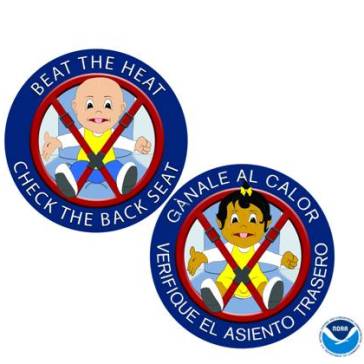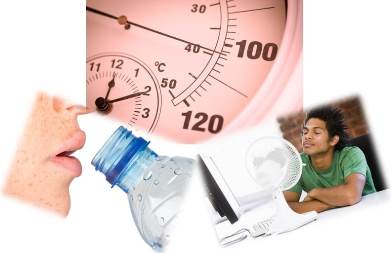
Never leave children, disabled persons, or pets in parked vehicles.
Each year, dozens of children, and untold numbers of pets left in parked vehicles die from hyperthermia, because the body absorbs more heat than it can handle. This can even occur on a mild day. Studies have shown that the temperature inside a parked vehicle can rapidly rise to a dangerous level for children, pets and even adults. Leaving the windows slightly open does not significantly decrease the heating rate.
- If you see a child unattended in a hot vehicle, call 9-1-1 immediately!
- Try placing your purse or briefcase in the back seat as a reminder that you have your child in the car, or put something of your child's in the front seat as a reminder.
- Always make sure all children have left the vehicle when you reach your destination.
- Don't leave sleeping infants in the car, ever.
- Make sure your child's safety seat and safety belt buckles aren't too hot before securing your child in a safety restraint system.
- Never leave your child unattended in a vehicle, even with the windows down.
- Teach children not to play in, on, or around cars.
- Always lock car doors and trunks, even at home, and keep keys and remote entry devices out of children's reach.
- Have a plan in place that your childcare provider will call you if your child does not show up for school.
General Heat Safety
Information on Heat Related Illnesses and First Aid.
- Listen to NOAA Weather Radio and local stations for the latest weather information, outlooks, advisories, watches and warnings.
- Excessive Heat Outlooks are issued when the potential exists for an excessive heat event in the next 3-7 days.
- Excessive Heat Watches are issued when conditions are favorable for an excessive heat event in the next 24 - 72 hours.
- Excessive Heat Warning/Advisories are issued when an excessive heat event is expected in the next 36 hours. Advisories are for less serious conditions that cause significant discomfort or inconvenience and could lead to a threat to life if caution is not taken.
- During extreme hot and humid weather, the body's ability to cool itself is affected. When the body heats too rapidly to cool itself properly, or when too much fluid or salt is lost from dehydration or sweating, the body temperature rises and heat related illnesses may develop.
- Heat related illnesses can range from heat cramps to heat exhaustion to more serious situations such as heat stroke. Heat stroke can result in death and requires immediate medical attention!
- Heat exhaustion is strongly related to the heat index. A relative humidity of 60% or more hampers sweat evaporation, which hinders your body's ability to cool itself.
- The risk of heat related illness dramatically increases when the heat index reaches up to 90º or more. So it is especially important to pay attention to the reported heat index.
- Some factors or conditions can make some people more susceptible to heat related illnesses than others. These include older adults (65+) and young children (0-4), obesity, fever, heart disease, diabetes, mental illness, poor circulation, prescription drug and alcohol use, and sunburn.
- Do not leave pets outside during extreme heat. If animals must be outside during extreme heat, ensure they have plenty of shade and water.
- Slow down, reduce, eliminate or reschedule strenuous activity until the coolest time of the day.
- Dress for summer by wearing lightweight, light colored clothing to reflect heat and sunlight.
- Drink plenty of water, non-alcoholic and decaffeinated fluids. Avoid alcoholic beverages and limit caffeinated beverages.
- During excessive heat periods, spend more time in air conditioned places.
- Don't get too much sun. Sunburns reduce your body's ability to dissipate heat.
- Wear plenty of sunscreen with high SPF protection, especially infants and children as they burn faster and easier than adults.
- Fun ways to cool off: Take advantage of community pools/splash pads! Wash your car and accidentally get others wet, or just put the sprinkler out in the yard and be a kid again!
